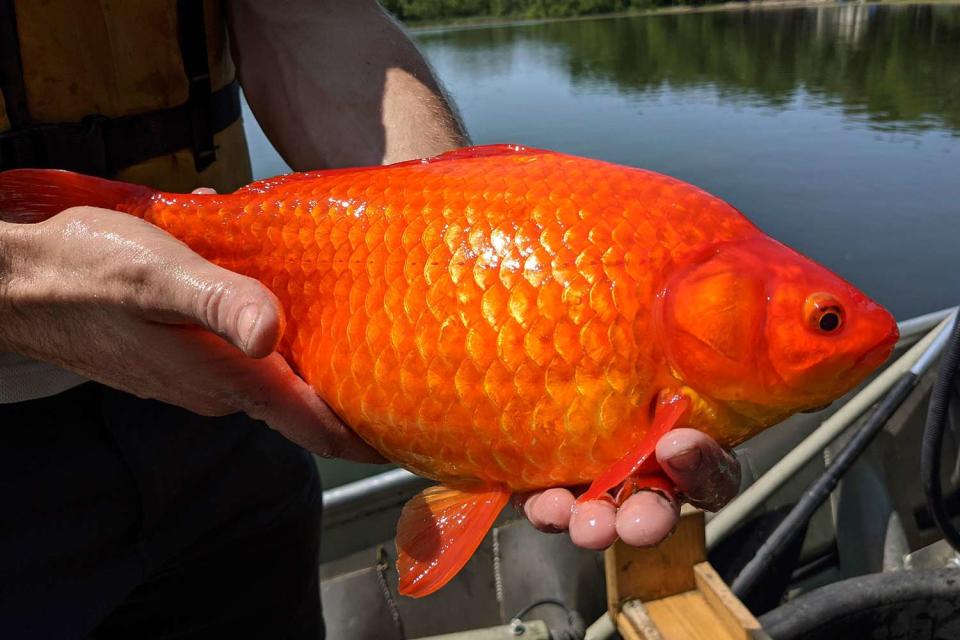Football-Sized Goldfish Have Invaded the Great Lakes: They 'Eat Anything and Everything'
"There are literally millions of goldfish in the Great Lakes, if not tens of millions," biology professor Nicholas Mandrak told The New York Times

City of Burnsville via AP
Giant goldfish are wreaking havoc on the Great Lakes.The Great Lakes are grappling with an unexpected — and unexpectedly large — obstacle.
The common goldfish, a species native to Asia and often kept as a pet in the U.S., is far from harmless when released into the wild — and it has been wreaking havoc on the Great Lakes, according to The New York Times.
Just a few inches long in captivity, the fish species can grow to be massive (up to 16 inches long) when feral, per the outlet.
When removed from constricting fish bowls and flake-based diets, goldfish grow to resemble bright orange footballs — a sight that has surprised visitors of the Great Lakes.
Related: Giant Goldfish Weighing 67 Lbs. Caught by Fisherman – See the Photos!
One fisherman, Mike Loughran, told TODAY that he nearly went overboard the first time he saw one of the colossal creatures in Lake Erie.
"Honestly, I was in shock," he told the outlet. "I almost fell off my kayak."
"It's just crazy to see something that, growing up, you go to the fair, and you get a little goldfish in a bag. All of a sudden, you're seeing one 14, 15 inches long," said Loughran, who added that he has caught roughly 10 of the giant fish on Lake Erie.
Apart from startling visitors, the supersized fish can devastate native marine wildlife and the ecosystems they inhabit, according to The Times.
The feral fish root up and eat plants that house native species and algae that, when consumed, cause them to expel nutrients that aid in the growth of harmful algal blooms, Christine Boston, an aquatic research biologist, told the outlet.
They can also "eat anything and everything," per Boston — and not many species can eat them.
"A fish would have to have a really big mouth to eat it," she told The Times.
Related: 'Resilient' Python Invasion in Florida Could Be 'Impossible' to Stop, U.S Officials Say
According to Boston, who works for Fisheries and Oceans Canada, common goldfish multiply rapidly. Not only do goldfish reach sexual maturation quickly, but females also possess the capability to reproduce several times in one season.

City of Burnsville via AP
Giant goldfish are wreaking havoc on the Great Lakes."There are literally millions of goldfish in the Great Lakes, if not tens of millions," Nicholas Mandrak, a biology professor at the University of Toronto Scarborough, told The Times.
The invasive species also has the upper hand when it comes to climate change because the fish can adapt to increasingly warm and decreasingly oxygenated waters, he told the outlet.
Mandrak said that goldfish first arrived in North America in the late 1800s. Still, their feral population has grown "dramatically" in the past 20 years — an increase he said was partially caused by people releasing pet goldfish into the wild.
Dr. Prosanta Chakrabarty, a professor with Louisiana State University's Department of Biological Sciences, also attributed human error to this recent boom, telling TODAY, "They are just people's pets that have been washed out or people released into their local lakes and rivers."
"And they keep growing as long as they have food," Chakrabarty added.
Related: Georgia Officials Are Trying to Stop Harmful, Invasive Lizards That Can Grow Up to 4 Feet Long
Another professor, Dr. Anthony Ricciardi, who teaches invasion ecology at McGill University, called this phenomenon "the 'Free Willy' syndrome," telling The Times that people believe goldfish will not cause problems in the wild because they are "small and cute."
He added that even the littlest ones can cause significant environmental harm.
Boston, who has been tracking goldfish in a Lake Ontario bay for several years, is the lead author of a new study in the Journal of Great Lakes Research, which details how to pinpoint these invasive goldfish populations.
"We found out where they are before they start spawning," she told The Times. "That's a good opportunity to get rid of them."
Never miss a story — sign up for PEOPLE's free daily newsletter to stay up-to-date on the best of what PEOPLE has to offer, from celebrity news to compelling human interest stories.
When it comes to actually removing goldfish (without killing native fish), Boston said options include using specialized nets below ice and "electrofishing" or using an electrical current to stun and remove them.
According to an article published by Michigan State University, one way people can help prevent the situation from worsening is to refrain from releasing pet goldfish into the wild.
Instead of dumping a fish in a body of fresh water, goldfish owners are encouraged to try rehoming their unwanted fish with a humane society, school, or education center. Or they can take the fish to a veterinarian or pet retailer to discuss humane disposal options.
For more People news, make sure to sign up for our newsletter!
Read the original article on People.

